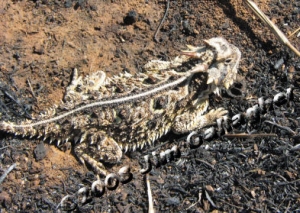Statement
Texas is a large and diverse state, and that applies equally to the animals that live here. Texas is home to more species of birds and reptiles than any other state, and second only to California in the number of mammals. However, of the estimated 1,245 vertebrate species found in Texas, only a few dozen are classified as game animals (deer, dove, ducks, etc), fur-bearers (beaver, fox, skunks, etc) or game/commercial fish (bass, catfish, redfish, etc). All the rest are considered to be non-game species, though this group also includes threatened and endangered species. About 213 of these animal species are found only in Texas.
Thousands of non-game species are common enough that they are afforded little protection (e.g., rattlesnakes, coyotes). However, taking any non-game species from public lands or waters and using them for commercial purposes (sale, barter, exchange) is illegal. If they are not removed from public lands or waters, most species of non-game can be sold, traded, etc., if the appropriate permits are obtained from Texas Parks and Wildlife and all regulations are followed.
Threatened and endangered species are those that are rare enough to cause concern that they may become extinct. Many of them have become rarer as a result of habitat loss and fragmentation and through competition with introduced species. Threatened and endangered species may be listed at either the Federal (e.g., black-capped vireo, golden-cheeked warbler, ocelot) or State level (Texas Kangaroo Rat, Texas Horned Lizard, Texas Tortoise). These species may not be taken, possessed or transported without special permits from Texas and/or the U.S. Fish and Wildlife Service. There are about 57 endangered vertebrate species in Texas, and about 72 threatened species.
So called “non-consumptive” wildlife users, such as birders, are the fastest growing group of outdoor enthusiasts. Like deer and quail hunters, these people often pay for the privilege of pursuing their outdoor passions, with wildlife viewing generating about $1.5 billion in Texas each year. Landowners throughout the state have the opportunity to protect the biodiversity of Texas and increase the annual revenue from their property by providing for the needs of non-game wildlife species.
Current Projects
For more information on Wildlife Management, you can check out our TexNat resource website.
For hunting regulations visit: http://www.tpwd.state.tx.us/regulations/outdoor-annual/
Websites
- RAMSES: Research and Management System for Endangered Species
- Texas Parks and Wildlife Department nongame regulations
- Texas AgriLife Extension Bookstore
- Partial listing of Extension publications available from the bookstore:
- L-5193: Texas Wild: Common Snakes of Texas
- L-5209: Texas Wild: Waterfowl
- L-5325: Texas Wild: Wading Birds
- WF-076: After the Conservation Reserve Program: Land Management with Wildlife in Mind
- SP-109: Wildlife Success Stories and Endangered Species (CD)
- SP-259: City Critters (CD)
